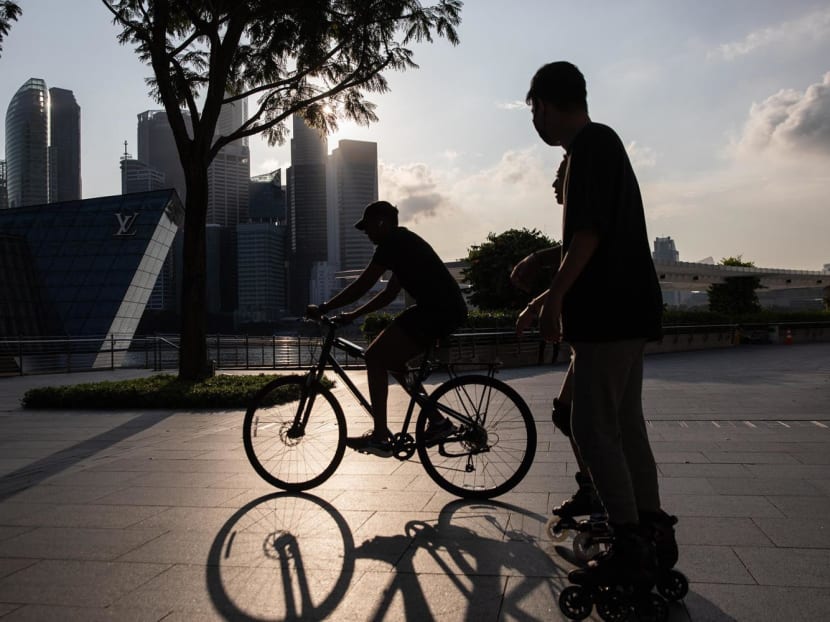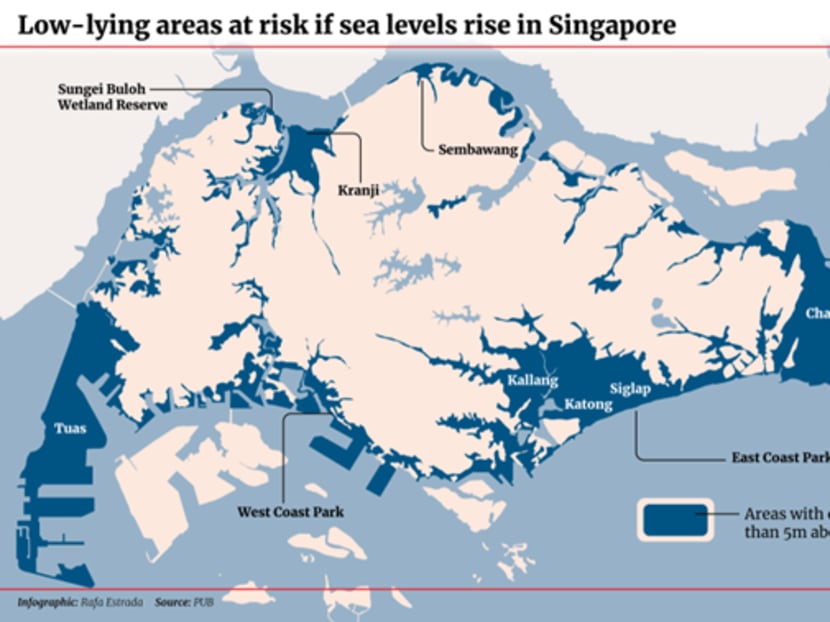- Joined
- Apr 14, 2011
- Messages
- 20,471
- Points
- 113
'The urgency has gone up': Singapore government agencies react to findings of third climate change study

Join our WhatsApp or Telegram channels for the latest updates, or follow us on TikTok and Instagram.
BY
KOH WAN TING
Published January 6, 2024Updated January 6, 2024
WhatsAppTelegramFacebookTwitterEmailLinkedIn
SINGAPORE — From choosing how to orientate buildings to deciding which trees to prune or plant, the projections from Singapore's latest regional study on climate change will aid the authorities in their plans to address the challenges of global warming.
The third Singapore National Climate Change Study released on Friday (Jan 5) sets out expected changes in key climate variables such as temperature, rainfall, humidity, wind and sea level across three scenarios with varying levels of carbon emissions.
Under its worst-case scenario, the study paints a picture of a Singapore that could get very hot most days and warm every night, set against a backdrop of extreme wet and dry weathers.
While striving to avoid such a scenario, the authorities are planning a step ahead to mitigate potential effects of global warming.
On Friday, a panel of three government representatives from the Urban Redevelopment Authority (URA), National Parks Board (NParks) and national water agency PUB, along with a food science expert from Nanyang Technological University (NTU), gave their input on the study at a symposium where the results were announced.
READ ALSO
Explainer: Why you should care about Singapore's latest national climate study
They pointed out how the results will affect ongoing and future solutions.
NParks, for example, singled out the data on wind speeds, which are set to increase by up to 20 per cent by the end of the century, and its effect on trees.
ADVERTISEMENT
"You see the trees in your parks, in your gardens ... so we need it for cooling. But all the amenities that they provide, they can also provide disamenities when there's a massive storm and the tree falls," said NParks director of coastal and marine Karenne Tun.
"So we need to be able to understand how climate change can impact something that is so essential for Singapore and how do we prevent that from becoming a liability?"
She pointed out that towards the end of last year, some trees became "bald" as they were pruned.
Data showed that trees that grow to a certain size or get squeezed are more vulnerable and might fall, she said. In these cases, NParks would prune the trees to prevent mishaps.
READ ALSO
Days hotter than 35°C almost all year round within this century: 5 key takeaways from Singapore's new climate study
"What version three then will do is provide the kind of data that will help us refine some of these models that we are using so that we can then know where do we prune the trees, what trees should be pruned, how much should they be pruned, at what time of the year, so that they do not become dis-amenities," Dr Tun said.
Version three could also help in predicting what kinds of trees could provide shade without resulting in disamenities to people.
PUB's director of coastal protection department Hazel Khoo said that beyond simply detailing mean sea level rise, the study could facilitate investigations into how higher wind speeds could potentially impact coastal surges and wave events.
"That is something that we will actually study and then we will use these projections and inputs together with our coastal-inland flood model that we are currently developing, it will give us an updated insight on the flood risk arising from both rainfall as well as sea level rise," Ms Khoo said.
Singapore's mean sea levels will rise under all three scenarios depicted in the study.
By the end of the century, the mean sea level will rise by between 0.23m and 1.15m, relative to the baseline period of 1995 to 2014. However extreme weather events like high tides and storm surges can cause levels to spike by 4m to 5m.

KEEPING COOL
URA's Mr Chiu Wen Tung, the group director of research and development, said that the study provides data on how heat impacts Singaporeans, informing the cooling solutions the agency pursues.The agency is integrating "climate-sensitive design" into its planning, for example arranging buildings in a way that increases wind speed and shade in new districts. Cool paint is another way to lower the temperatures of buildings, he said.
Trials for "cool paint", conducted by the Housing and Development Board, showed that temperatures of the blocks with such paint could be lowered by about 2°C, Mr Chiu told the media after the panel discussion.
According to the study, more very hot days are expected as Singapore nears the end of the century even if the world takes a path of sustainable growth. The study also predicts more warm nights and more days with high heat stress.
Singapore is expected to become warmer under all scenarios, with annual mean temperatures rising between 0.6°C and 5°C by end-century.
"Singapore has always had to deal with heat because we are in a tropical country," said Mr Chiu.
"And then we have heat due to urbanisation from the urban heat island effect as well as now another maybe ... up to five degrees depending on which scenario shown from climate change based on version three, so heat is something that we always had to live with. But I think the urgency has perhaps gone up with the version three findings."
On how URA would work with the private sector, Mr Chiu said it invests in research on cooling measures but will require the private sector's buy-in for implementation.
"It requires the builders, the developers, the building owners, the architects, the landscape designers to all participate to help to build buildings that incorporate all these climate-sensitive design, where you can have higher wind flow, shade provision, more expansive greenery and implement the strategies that will help us lower the temperatures."
NTU's Endowed Chair Professor in Food Science and Technology William Chen pointed out that beyond the impact on health, temperatures would disrupt crop yields and food supplies.
However, he cautioned against an oversimplified solution to increase supplies amid a growing population.
"The simplest way is to clear more land and clear more forests to make land for farming. Along the way we actually remove a lot of carbon sink, leading to global warming. It's a vicious cycle, and in the end, there's not enough food and so on."
Instead, tightening the food cycle to reduce food waste would be a more viable way forward, Prof Chen said.
Participants of the symposium also posed questions to members of the panel, with one asking how Singapore would help its fauna and flora cope with the warming climate.
Dr Tun said that the first step would be to understand how climate change impacted an organism's biology through research. Extreme weather, she pointed out, would affect trees both ways. The tree could get water-logged and rot, while dry spells could affect the stability of the tree.
In response to that, the authorities could find ways to help the plant adapt, she said. CNA


